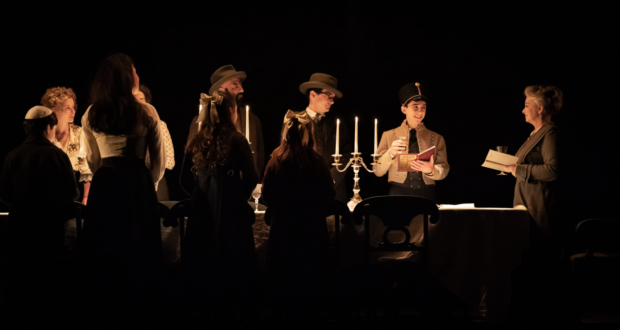Tense, touching and timely. Leopoldstadt is the kind of play you really need to be there in person to experience.Summary
Rating
Unmissable!
Much has already been said and thought about Leopoldstadt, Sir Tom Stoppard’s final work, directed by Patrick Marber. It’s had many esteemed reviews since its premiere in January 2020 and been called a masterpiece, so what can possibly be added?
Well, art and performance are a combination of the work itself along with what the individual brings to the experience. I came to Leopoldstadt as someone who only discovered Stoppard a month ago and who has only encountered Jewish experiences through The Holocaust, school teachings and the media. This review is most relevant for anyone considering Leopoldstadt from a similar starting point.
It is not a comfortable watch. How can it be when you know that the characters will be – have been – erased from the family albums of so many? How can you view this passively if you know that Stoppard himself was born Jewish and had family wiped out?
Set across six decades from 1899, it launches us into the Vienna household of a relatively wealthy extended family at Christmas. Comprised of Jews and Catholics, the family are just like any other. The stage is abundant with life; children argue over who puts the star on the tree, adults have conversations about books and there is a lingering babble for attention, echoed by the movement of the actors on stage. It is a chaos of normalcy.
However, it is these snapshots of life throughout the play that illustrate the growing persecution of Jews. From being overlooked professionally and banned socially, to the signing over of assets toward the end, the fortune of each character speaks a sub-story. Passionate dialogue around being Austrian but perceived by society first and foremost as Jewish highlights the struggle ethnic minorities endure and the duelling between different aspects of identity.
Faultless in their delivery, the cast kept the humane energy of the production throughout. The timing and pace of dialogue plays an important role, sweeping the audience along on an unknown tide whilst the excess of characters serves as a visual reminder of the shared memories, overlapping lives and connections The Holocaust robbed many of. Although not originally planned, the lack of interval enhances the impact as do the use of effects, sound and placing well-curated content onto a screen. For a play set in the past, it has a very modern feel.
By the final scene, tension in the theatre was palpable. Three actors on stage provide a stark contrast to the opener. Away from the frenetic, poignancy of Christmas, we are faced with a post-war reunion and minimal staging. Props and set become irrelevant. The physical shrinkage of the family is evident and the stuttering relationships between characters demonstrates a very real, longitudinal impact. This is where you realise you have witnessed something above reviews. It may be a fictional narrative, but it contains part of the writer. It is semi-autobiographical. It is truth.
Rarely emotional, this scene stunned me.
Talking to people around me at the end, it was clear I hadn’t been the only one deeply moved. In placing a family across generations, filling the stage with fast-paced, culturally referenced dialogue and focusing on the nuances of the everyday, Leopoldstadt draws the audience in to both affect and reflect.
The play should not be seen for the band of people that deliver Leopoldstadt to us, but for the people whose lives were dismantled and diminished. This play is a testament to them.
Written by: Sir Tom Stoppard
Directed by: Patrick Marber
Produced by: Sonia Friedman Productions
Although this weekend marked the end of Leopoldstadt’s performances, it will be available to view in cinemas from 27th January 2022, courtesy of The National Theatre Live.
 Everything Theatre Reviews, interviews and news for theatre lovers, London and beyond
Everything Theatre Reviews, interviews and news for theatre lovers, London and beyond



